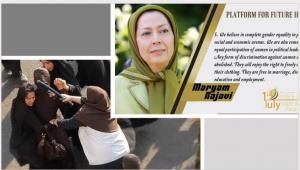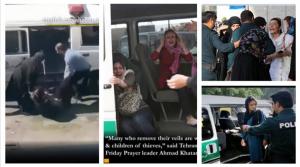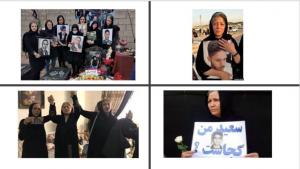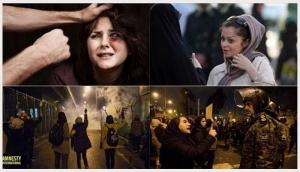( Video) The Root of Iranian Regime’s Recent Misogynous Rules and Actions

Women’s rights and their role in society are a yardstick to assess the degree to which a country is democratic or not. Women’s deplorable plight under the mullahs’ regime is a testament to Iran’s appalling general human rights situation.

Alireza Adiani, the head Security Force, was quoted by Hamshahri daily as saying, “The moral security police is going to start its work in the form of the new police structure that was announced by the commander-in-chief (i.e., Khamenei).”

A long list of women arrested, the mothers of the martyrs of the November 2019 uprising, groups of cinematographers, artists, bloggers, and Telegram channel owners, and several Christians and Baha’is as well as others whose number is increasing.
Brutality against women is an indelible stain on societies. But what Iranian women suffer under the misogynous regime ruling that country is unimaginable.
In a blatant call to step up repressive measures, the Judiciary Chief Gholam Hossein Mohseni Eje’i told Entekhab daily today, “Some of the regime’s arch enemies seek to promote vulgarity and indecency in society. Dealing with this issue requires intelligence work. Prosecutors, bailiffs, and the intelligence system should arrange the necessary legal measures against people who openly commit offenses and crimes in public; and they must act diligently regarding the important task of identifying organized movements directed by foreign services to promote immorality in our society.”
The same day, Alireza Adiani, the head of the Political-Ideological Organization of the State Security Force, was quoted by Hamshahri daily as saying, “The moral security police is going to start its work in the form of the new police notification structure that was announced at the end of the last (Iranian) year by the commander-in-chief (i.e., Khamenei).”
The Iranian Resistance strongly condemns the raids and arrests and calls on enraged Iranians, especially the youth, to protest and resist the regime’s repressive measures.
The Iranian Resistance also demands immediate action by the UN High Commissioner for Human Rights, UN Human Rights Council, and the UN rapporteurs to secure the release of the arrested.
It reiterates the imperative of dispatching an international fact-finding mission to visit Iran’s prisons and meet with prisoners, especially political prisoners.
In recent years, women’s rights have become the paramount moral challenge across the globe.
The brutality inflicted on so many women worldwide is a dark and indelible stain on civilized societies. But what Iranian women suffer under the misogynous regime ruling that country is unimaginable.
Women’s rights and their role in society are a yardstick to assess the degree to which a country is democratic or not.
Women’s deplorable plight under the mullahs’ regime is a testament to Iran’s appalling general human rights situation.
Unlike other countries, in Iran, the state encourages, legalizes, and practices misogyny. In its freshest misogynous attempt, the Iranian regime has embarked on a repressive campaign to “enjoin virtue and prohibit vice.”
The regime’s Supreme Security Council adopted this plan, dubbed “chastity and hijab.” in 2005. The mullahs had implemented this oppressive measure for years and had to stop it as they feared intense and widespread public backlash. Since the plan has been adopted, the so-called “guidance patrol” of the regime’s nefarious “morality police” have arrested and assaulted dozens of Iranian women on the pretext of “mal veiling.”
On June 26, the deputy prosecutor in Mashhad sent a letter to the governor of this city, demanding that unveiled women be prevented from getting on subway trains.
These measures are in addition to the regime’s thugs attacking women with acid, running them over with cars, and pepper spraying them, like the last time some women tried to enter a stadium to watch a soccer match in Mashhad.
Now, Iran’s misogynous regime has reinstated this law. But why?
While misogyny is the regime’s essential characteristic, the answer lies in the current volatile state of Iranian society. The ongoing protests, with Iranian women at the forefront, have rattled officials as they increase the possibility of another significant uprising, like the one in November 2019.
“Today, the veiling is under attack, and those improperly veiled are acting in favor of the enemy’s cultural attack,” Hassan Alidadi-Salimani, the supreme leader’s representative in Kerman, said during Friday’s prayer sermon, as reported by state-run Fars news agency on July 8.
“One of the methods the enemy uses to pursue its sinister objectives is taking women’s chastity and then destroying the family,” Ghorbaniali Dori Najafabadi, the Friday Prayer leader of the central city of Arak, said on July 7, as quoted by Fars. But what about thousands of innocent girls and women raped and killed by Najafabadi’s ilk in prisons or his agents while he was the Minister of Intelligence?
In yet another brazen remark, Tehran’s prayer leader Ahmad Khatami linked innocent women and girls arrested under the pretext of improper veiling to crooks. Khatami claimed: “Some ask why you care about women’s hair more than corruption. I say we should deal with corruption and mal-veiling concurrently. Many of these women are linked to these corrupt elements.”
He also praised the regime’s judiciary, which has actively persecuted Iranian women for various reasons.
It is worth noting that as the mouthpiece of the supreme leader, Ali Khamenei, Friday Prayer leaders lend legitimacy to Khamenei’s intention to clamp down on society, which became evident when he chose Ebrahim Raisi, an unscrupulous murderer, as president.
Watching this gender apartheid in Iran is indeed heart-wrenching.
But would doing it help the regime achieve its goal and preserve its security?
The regime has a backward mindset about women’s role in society and limits it to rearing children and working in the kitchen. Since the resilient and vibrant Iranian women have resisted the regime’s medieval rules, they have been subjected to the most brute forms of oppression.
“Our experience shows the more we use Islam to oppress people, the more people distance themselves from the [regime],” Mahmoud Sadeghi, a former MP, warned regime officials on Friday, as quoted by the Dideban website.
Shahin Gobadi
NCRI
+33 6 61 65 32 31
email us here
The clerical regime has resorted to widespread arrests of women for compulsory hijab in Tehran and other cities in fear of growing social uprisings.
Legal Disclaimer:
EIN Presswire provides this news content "as is" without warranty of any kind. We do not accept any responsibility or liability for the accuracy, content, images, videos, licenses, completeness, legality, or reliability of the information contained in this article. If you have any complaints or copyright issues related to this article, kindly contact the author above.


